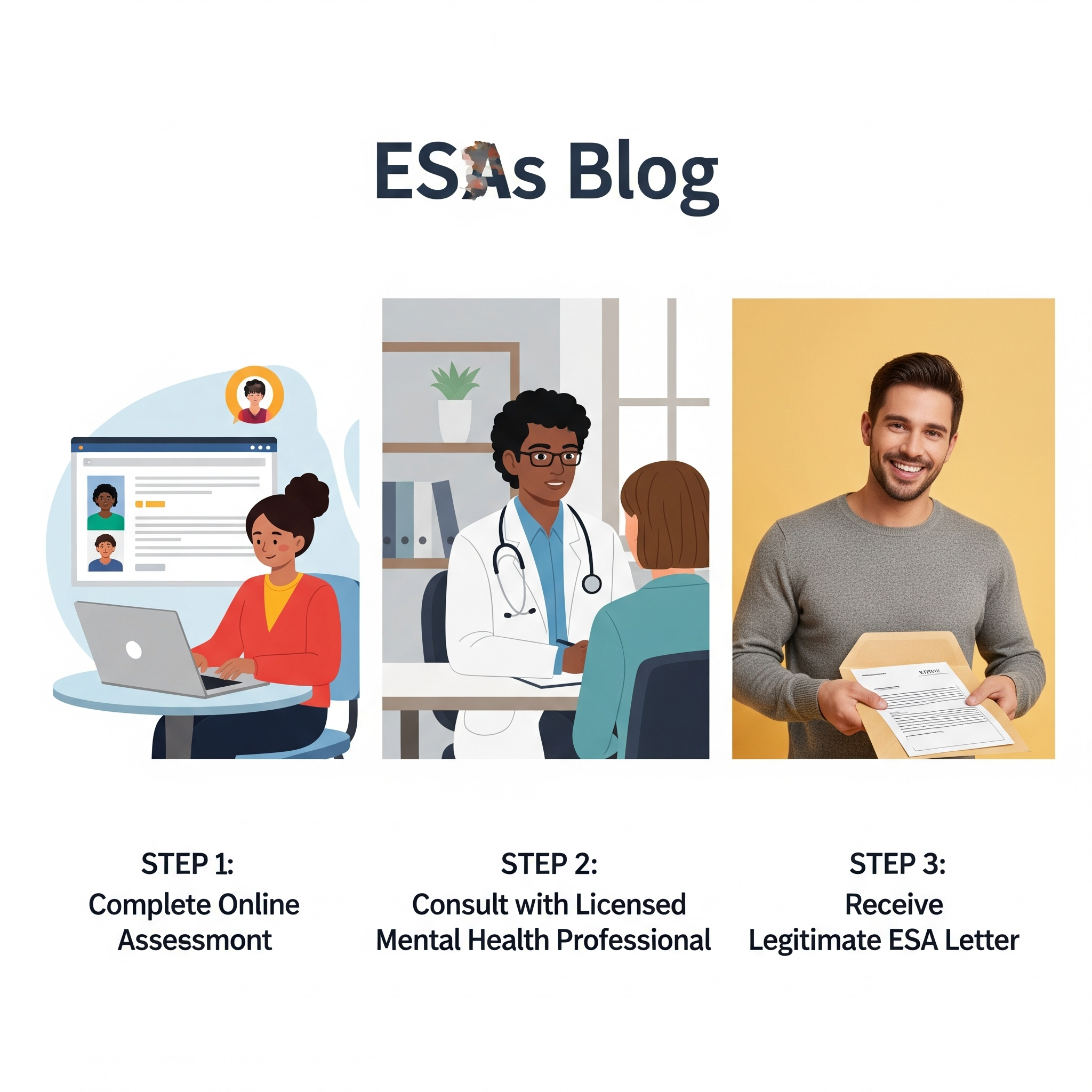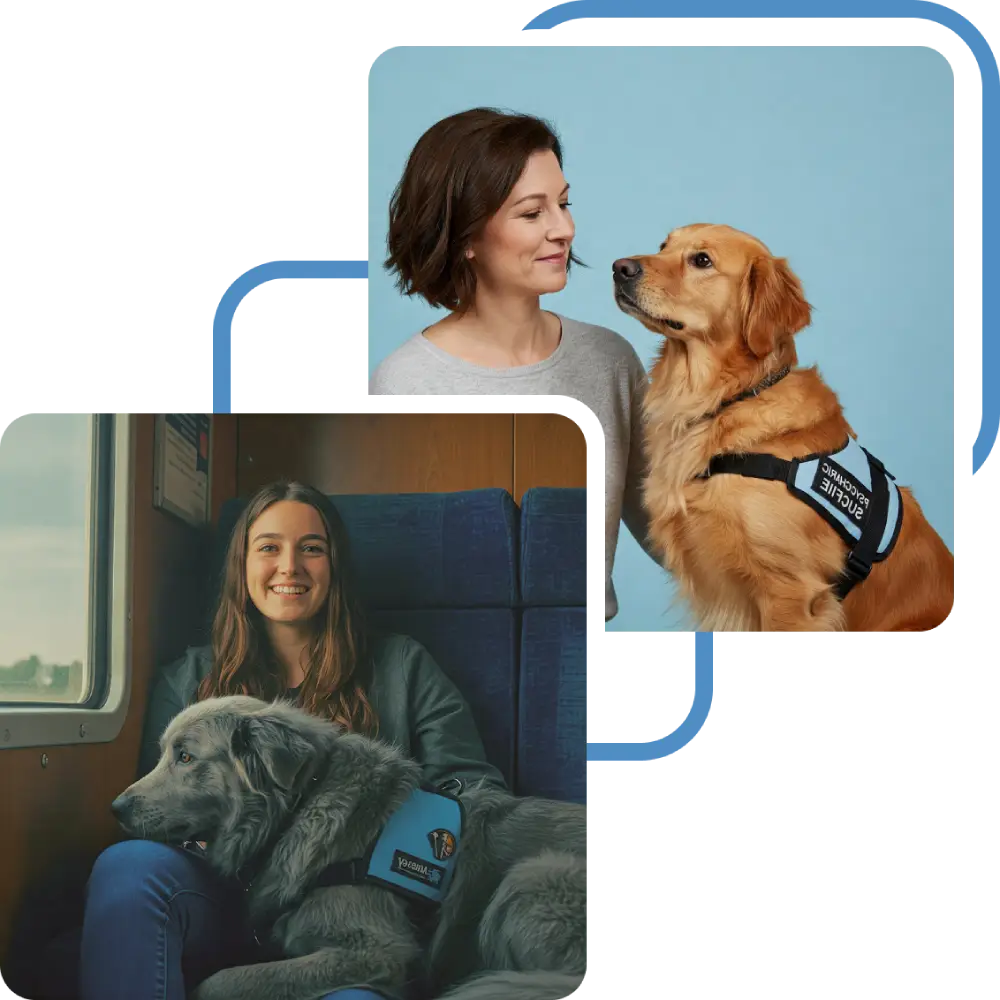When considering an Emotional Support Animal (ESA), many people picture large, fluffy retrievers or calm, stoic German Shepherds. While these breeds certainly make wonderful companions, the truth is, comfort and support come in all sizes! For individuals living in apartments, with limited mobility, or who simply prefer a more portable companion, small dog breeds can be absolutely ideal ESAs. These pint-sized pups often pack a powerful punch of affection, intuition, and calming energy, making them perfect partners in managing mental health challenges.
At CertifyESA, we believe that the right ESA is one that genuinely supports your well-being, regardless of its size. We connect individuals with licensed mental health professionals who can assess their needs and provide the necessary documentation. In this blog, we’ll explore the unique advantages of small dog breeds as ESAs and highlight some specific breeds known for their exceptional emotional support qualities.
—
Why Choose a Small Dog as an ESA? The Benefits of Being Compact
Small dog breeds offer a distinct set of advantages that make them particularly well-suited for the role of an Emotional Support Animal:
-
Portability and Maneuverability: Small dogs are incredibly easy to travel with, whether you’re going to a friend’s house, a doctor’s appointment, or just a short car ride. Their compact size allows them to fit comfortably in carriers, under airplane seats (if they meet pet carrier requirements), and in crowded public spaces, making them less disruptive and more adaptable to various environments (ManyPets, 2023).
-
Apartment and Small Space Living: For city dwellers or those in smaller homes, a large dog might not be feasible. Small breeds thrive in confined spaces, often requiring less indoor room to roam and fewer extensive outdoor exercise needs, though daily walks are still crucial.
-
Lower Maintenance (Often): Generally, smaller dogs consume less food, require less space, and can be easier to bathe and groom than their larger counterparts. This can reduce the physical and financial burden on their handlers, making pet ownership more manageable, particularly for those with chronic health conditions.
-
Lap Warmth and Cuddlability: Many small breeds are natural lap dogs, excelling at providing close physical comfort and deep pressure therapy. Their ability to snuggle right into your lap or beside you on the couch offers immediate, tangible solace, which can be immensely beneficial for anxiety or depression.
-
Less Intimidating: For individuals who might be nervous around larger dogs, or for those in social settings where a large dog might draw unwanted attention, a small, friendly pup can be less intimidating and more approachable.
-
Longer Lifespans: Generally, smaller dog breeds tend to have longer lifespans than larger breeds. This means a longer period of consistent companionship and emotional support, which can be invaluable over the years (PRISM K9, n.d.).
—
Key Qualities of a Great ESA (Regardless of Size)
While size is a factor, the core qualities of any good ESA remain consistent:
-
Calm Temperament: An ideal ESA should be calm, even-tempered, and not easily agitated. Their peaceful demeanor can help regulate your own emotions and reduce stress (ManyPets, 2023).
-
Affectionate Nature: The primary role of an ESA is to provide comfort. A dog that is naturally loving and enjoys physical affection will be more effective in offering emotional support.
-
Social and Friendly: While their main bond is with you, an ESA should generally be amiable towards others. A dog that is overly aggressive or fearful can inadvertently add to your stress.
-
Intuitive and Responsive: Many excellent ESAs seem to possess an innate ability to sense their owner’s emotional state. They might offer comfort without being cued, providing a timely intervention when you’re feeling anxious or down (ManyPets, 2023).
-
Adaptability: Life presents many different environments. A good ESA should be able to adapt to new places and situations without becoming overly stressed or anxious themselves.
-
Trainability: Even though ESAs don’t require specific task training like PSDs, basic obedience and good manners are essential. A well-behaved dog is easier to manage in various settings, reducing potential stressors for the handler.
—
Top Small Dog Breeds That Excel as ESAs
While the best ESA is always an individual dog whose temperament aligns with your needs, certain small breeds are renowned for qualities that make them excellent candidates:
-
Cavalier King Charles Spaniel:
- Why they’re great: Often called “the comforter spaniel,” Cavaliers are exceptionally gentle, affectionate, and empathetic. They thrive on human companionship and are incredibly attuned to their owners’ emotions, making them perfect for lap cuddles and emotional grounding (ManyPets, 2023).
- Considerations: They do require regular grooming and are prone to certain health issues, particularly heart conditions, so responsible breeding and vet care are important.
-
Bichon Frisé:
- Why they’re great: These fluffy, cheerful dogs are known for their playful yet gentle nature. They are highly adaptable, love to be the center of attention, and offer boundless affection. Their “cotton ball” appearance is also very comforting, and they are often a good choice for allergy sufferers due to their hypoallergenic coats (Wag!, n.d.).
- Considerations: Their coat requires regular grooming to prevent matting.
-
Poodle (Toy or Miniature):
- Why they’re great: Poodles are highly intelligent, easily trainable, and very eager to please. This makes them adaptable to various situations and less prone to behavioral issues that could add stress. They are also known for being affectionate and form strong bonds with their families. Like Bichons, their hair is considered hypoallergenic, making them suitable for many households (US Service Animals, n.d.).
- Considerations: Poodles need mental stimulation due to their intelligence and require professional grooming every few weeks.
-
Shih Tzu:
- Why they’re great: Despite their “lion dog” translation, Shih Tzus are true companion dogs. They are outgoing, affectionate, and thrive on human interaction. Their primary goal seems to be to sit on your lap and provide comfort, making them excellent for alleviating loneliness and providing constant companionship (ManyPets, 2023).
- Considerations: Their long, flowing coats require daily grooming to prevent tangles and mats.
-
Pug:
- Why they’re great: Pugs are known for their charming, comical personalities and their deep affection for their owners. They are excellent listeners, happy to sit by your side and offer a comforting presence. Their expressive faces can often bring a smile, and they are generally adaptable to apartment living (Wag!, n.d.).
- Considerations: Pugs are brachycephalic (flat-faced) and can experience breathing difficulties, especially in hot weather or during strenuous exercise. They are also prone to certain eye conditions.
-
Chihuahua:
- Why they’re great: Chihuahuas bond very deeply with their owners and are incredibly loyal and protective. They are highly portable and thrive on being close to their person, offering consistent physical contact and a strong sense of companionship. Their feisty personalities can also provide a welcome distraction from negative thoughts (ManyPets, 2023).
- Considerations: They can be prone to “small dog syndrome” if not properly socialized and trained, potentially leading to excessive barking or fear aggression. Early socialization is key.
-
Dachshund:
- Why they’re great: Known for their distinctive long bodies, Dachshunds are affectionate, playful, and very loyal companions. They love to snuggle and are highly intuitive, often sensing when their owner needs comfort. Their engaging personalities can be a great mood booster (Wag!, n.d.).
- Considerations: Their long backs can be prone to spinal problems, so care must be taken with their movement (avoiding jumping from high places) and weight management.
-
Maltese:
- Why they’re great: These tiny, elegant dogs are renowned for their gentle, sweet, and affectionate nature. They are devoted companions who thrive on being close to their humans, offering constant cuddles and emotional support. Their bright, playful disposition can help lift spirits.
- Considerations: Their beautiful white coats require regular grooming to keep them tangle-free and clean.
—
Important Considerations When Choosing Your ESA
While breed characteristics can be a guide, remember that every dog is an individual. When selecting a dog for an ESA role, consider:
-
Temperament First: Prioritize the individual dog’s temperament over its breed. A calm, affectionate mixed-breed from a shelter might be a perfect fit.
-
Your Lifestyle: Consider your living situation, activity level, and how much time you can dedicate to grooming, training, and exercise.
-
Allergies: If you or someone in your household has allergies, explore hypoallergenic breeds.
-
Age of the Dog: Puppies require significant training and socialization, which can be overwhelming for someone managing mental health challenges. An adult dog with an established, calm temperament might be a better choice.
-
Ethical Acquisition: If you choose to buy from a breeder, ensure they are reputable and prioritize health and temperament. Consider adopting from a rescue organization, where many wonderful, well-tempered small dogs are waiting for loving homes.
—
How CertifyESA Supports Your Journey to Finding Your ESA
Obtaining a legitimate Emotional Support Animal letter requires a thorough assessment by a licensed mental health professional (LMHP). This ensures that your need for an ESA is medically substantiated and that your documentation complies with federal guidelines, particularly the Fair Housing Act.
CertifyESA connects you with qualified LMHPs who can:
-
Conduct a Comprehensive Evaluation: Assess your mental health condition and determine if an ESA is a necessary component of your treatment plan.
-
Provide Legitimate Documentation: If appropriate, issue an APA-formatted ESA letter that meets the legal requirements for housing accommodations.
-
Offer Expert Guidance: Answer your questions about ESA regulations and help you understand your rights and responsibilities as an ESA owner.
We prioritize ethical practices and ensure that all assessments are clinically sound. We believe that access to genuine emotional support should be straightforward and transparent, empowering you to benefit from the profound comfort a canine companion can offer.
—
Conclusion: Small Dogs, Immense Impact on Well-being
Small dog breeds, with their convenient size, loving dispositions, and often intuitive natures, can make truly exceptional Emotional Support Animals. Whether it’s the gentle companionship of a Cavalier King Charles Spaniel, the cheerful devotion of a Bichon Frisé, or the comforting presence of a Shih Tzu, these tiny companions prove that the most profound support often comes in the smallest packages.
If you are navigating mental health challenges like anxiety or depression, and believe the consistent, unconditional love of a small dog could offer significant solace, explore the possibility of an ESA. CertifyESA is here to guide you through the process, connecting you with the licensed professionals who can help you legitimize this important partnership and find your calm with a small but mighty furry friend.
—
References
US Service Animals. (n.d.). Can Small Breeds Be Service Dogs? The 5 Best Small Breeds for Service Work. US Service Animals. https://usserviceanimals.org/blog/small-service-dog/





